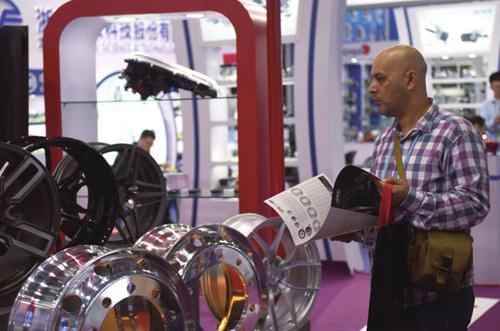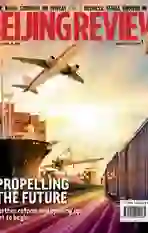Chinese Carmakers Confident on New Opening-Up M easures
2018-05-09
For Chinese carmakers at- tending the nations largest trade fair, the countrys pledge to further open up the economy will bring more opportunities than challenges.
Authorities recently announced that China would ease foreign equity restrictions in the automobile industry and significantly lower import tariffs for vehicles as part of the countrys broader push for economic opening up.
While analysts believe that wider access could intensify competition in the Chinese market, Wu Jun, assistant general manager of international trade at Zotye Domy, a privately owned automaker, shrugged off the concerns.
“The easing of foreign equity restrictions can allow private domestic auto companies to better interact with foreign firms and help us improve,” said Wu at this years China Import and Export Fair, also known as the Canton Fair, in south Chinas Guangdong Province.
According to Wu, the performance of many Chinese cars could now rival vehicles made in Japan as Chinas manufacturing capabilities are signifi cantly more advanced compared with 30 years ago.
In addition, as a result of government initiatives to support the new-energy vehicle(NEV) industry, many Chinese carmakers have a competitive edge in terms of NEVs, making cooperation between foreign and Chinese carmakers benefi cial for both sides.
Shen Hui, founder and CEO of NEV startup WM Motor, said that a series of domestic brands such as Geely Auto have emerged and become internationally competitive after Chinas four decades of reform and opening up.
However, for Shen concerns remain as to whether Chinese carmakers will be allowed to conduct mergers and acquisitions in foreign markets such as the United States, where protectionism seems to be rising.
Fu Yuwu, head of the Society of Automotive Engineers of China, said that China is fully prepared to relax ownership restrictions.
“It is not something to be afraid of considering Chinas strength in technology, capital, management and talent. Its just a matter of time before restrictions are eased,” Fu said.
Data from the China Association of Automobile Manufacturers showed that China produced some 29.02 million automobiles and sold 28.88 million last year, ranking fi rst worldwide for the ninth consecutive year.
Carmakers attending the Canton Fair said that lower tariffs for imported vehicles would inevitably bring increased competition for domestically-manufactured automobiles, especially medium-sized passenger cars sold at prices above 200,000 yuan ($31,809).
But more fierce competition will also force domestic carmakers to invest more heavily in research and development (R&D;) and encourage innovation, resulting in the overall upgrade of Chinas auto industry, they said.
He Xiaopeng, Chairman of electric vehicle maker XPENG Motors, said that the new opening-up policies will be a turning point for Chinas auto sector in shifting from quantityoriented to quality-oriented growth, bringing benefi ts to domestic consumers.
Wu said that Zotye Domy invests around 1 billion yuan ($159 million) annually in R&D;, or roughly 10 percent of its sales.
“For an emerging company like us, if we dont invest heavily in R&D;, it will be hard to sell our products on the market,” he said.
